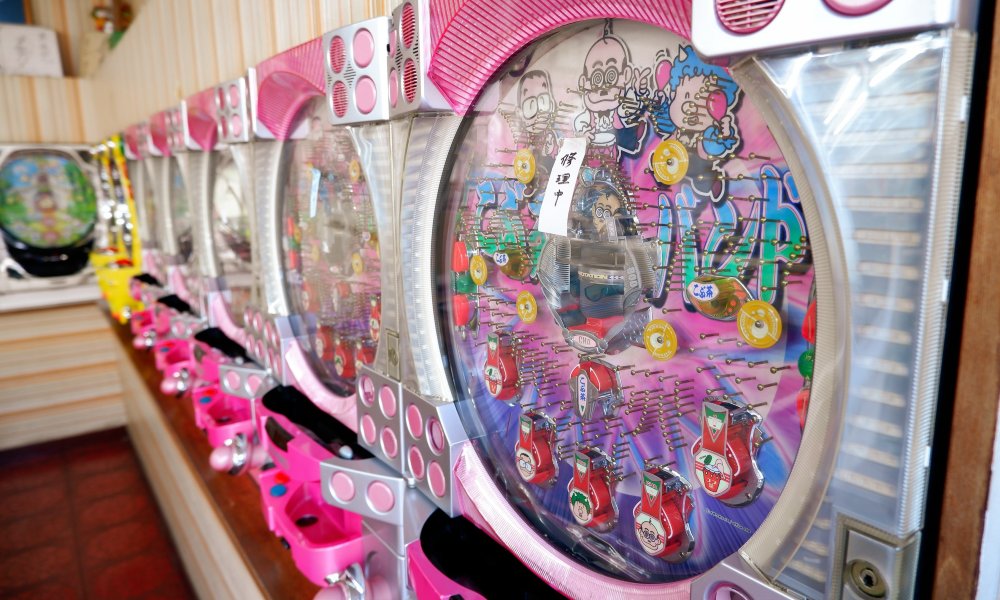Saving Pachinko: What's Being Done By Japan's Multi-Billion Entertainment Industry?
March 16, 2023
In the English-speaking world, it wasn't too long ago that news and business pieces were suddenly all over the place shedding light on the colossal Japanese pachinko industry. Hailed as the nation's multi-billion obsession, the pinball-cross-slots games featured in thousands of halls across the country and, famously, the pinball gambling industry brought in 30 times more cash than Las Vegas casinos.

The hand-written notice on this old-school pachinko machine means 'out of order'.
That figure was drawn from a 2018 piece, and a lot has happened in the five years since. Along with the obvious, a drastic change in perception and a desire to capture the hearts of younger demographics is leading to pachinko parlors adjusting on the fly. It's not just to make more money, either. In fact, it's in an attempt to save pachinko, as the iconic form of Japanese entertainment is on the decline.
A giant in decline
The last couple of years have seen the narrative on pachinko parlors change from a tremendous money-making industry to a giant that's swiftly waning in size. Reports indicate that, throughout 2021, over 630 pachinko parlors closed. Still, that did leave over 7,600 in the country under the watchful eye of Japan Amusement Business Corporation. That year, the number of machines also sunk by over 226,000, but only down to 3.6 million.
Even before those 2021 figures came in, 2019 to 2020 saw declines in some circles. The pachinko manufacturer Daikoku Denki reportedly showed that the market size had sunk by $49 billion from 2019 to 2020. Still, it remained a $133 billion industry. It could be seen as the continuation of a trend, only made more apparent by 2020. Since 2005, pachinko net sales in halls fell from ¥34.9 trillion ($263 billion) to ¥20.7 trillion ($156 billion) in 2018.
Now, the pachinko industry is kicking into action, making some fairly drastic changes in the hopes of appealing to a wider audience and surging back up in profits. To do this, they see younger peoples' preference for mobile games, pop culture, and adversity to chain smoking as key areas to attack. So, they've brought in games featuring everything from assets from popular video games to trending J-Pop groups, made more spacious and airy parlors, and introduced privacy dividers.

The sudden decline of pachinko in Japan is eerily similar to that of bingo in the UK.
More could be done to preserve pachinko
The sudden decline of pachinko in Japan, with the focus being placed on its stigma for older gentlemen who chain smoke, is eerily similar to that of bingo in the UK. To bounce back in a huge way, the bingo industry revitalized its halls, much as pachinko parlors are doing now, and took the big step to the online space. Integrating more games and convenient experiences, bingo is now thriving in the UK.
Importantly, a huge part of this move in recent years has been to adopt new technologies to present games that appeal to the most tech-savvy and online-based potential players. Enter online bingo live, a live-streamed show of bingo that can be played in real-time with chirpy, charismatic hosts. It has proven very popular with the entertainment-seeking, fun-loving community of online bingo players, even encouraging some to return to halls. A steady stream of welcome offers and regular bonuses also works well to attract new players and retain existing ones, a strategy that similar industries should look to employ.
Pachinko would require a few more adjustments to make a similar move into live, immersive gaming, what with it being a physical pinball-like game with buttons and input. Still, there is a game that shows that such mobile input from anywhere is possible. Clawee, the mobile app, connects players to a live claw machine – just like those seen in arcades – and people pay in, control the claw from their mobiles, and get sent anything that they win.
Pachinko is still a multi-billion industry in Japan, and certainly isn't going anywhere anytime soon, and yet, to get ahead of a potential sudden drop, the industry should explore live online options to reach its intended new audience.
Related content
